[Original by Risa FUJII, 2018 Public Relations Intern/Takako NASU, 2018 Webpage Analysis Intern (December 25, 2018); Translated by S. Altman]
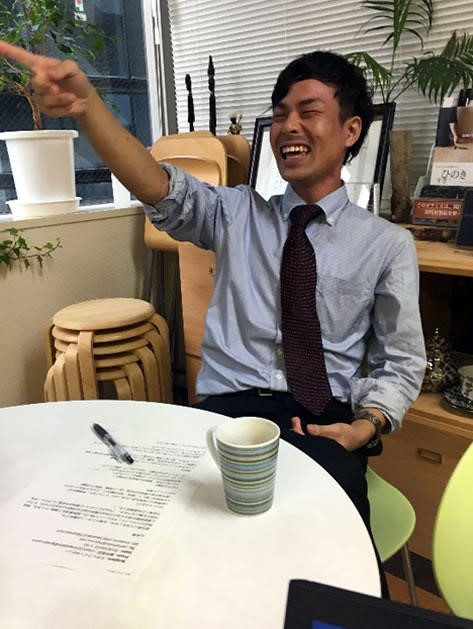
Mr. Yamamoto overjoyed and laughing throughout the interview.
Hello, everyone! I am Fujii, the 2018 Public Relations Intern. This time, in the second round of staff interviews in 2018, I interviewed Takayuki Yamamoto, our local staff worker in Sudan. Mr. Yamamoto started at JVC in April of 2018 and was assigned to Sudan in October of the same year however; this interview was held while he still worked at the Tokyo office before his transfer. Mr. Yamamoto is the epitome of a Kansai person and the life of the party, always making people laugh. Usually he is very lively, but this time we could get to know about the strong passion that he keeps to himself. I’ll spare no detail in this interview with Mr. Yamamoto.
What started your interest in international cooperation?
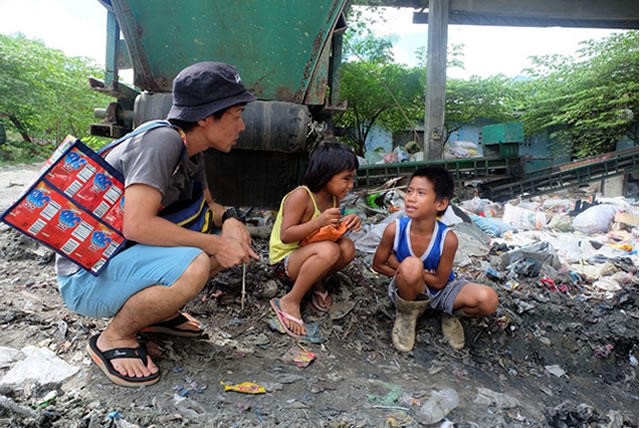
Mr. Yamamoto exchanging words with children who live near the Smokey Mountains.
It was around spring time, when I was 19 years old. When I was a 2nd year student in university, I joined a student organization called “Merry” and participated in a study tour in an area of the Philippines called the “Smoky Mountain”. It was there that I happened upon a barefoot girl with tattered clothes who was picking up trash. I questioned why a barefoot girl who goes without school was in a place like this. When I asked about her situation through the translator the girl said, “I’ll die if I don’t pickup this trash today”. At this period in my life, I was determined to become a teacher, but I recognized that there was something more important than this. I thought I must become someone who supports children going to school which set me down the path of international cooperation. After the study tour, I started searching for something I could do through non-formal education which is a type of education outside school.
By the way, from when did you think you wanted to become a teacher?
Around my second year of high school. At first, I thought I wanted to be a pediatrician because I liked children but for many reasons, like my fear of blood, it was impossible. Around Elementary school, a teacher I admired mentioned not building one’s happiness off helping others misfortune. I admired that way life. That’s why I aimed to be a teacher. For that goal, I enrolled in a University’s Department of Education and received a license to teach mathematics to Elementary, Jr. High School, and High School students.
Apart from your main studies, what kind of University life did you live?
Even now, I can’t forget that April; it was during the spring of my first year of University. I did something similar to the boy scouts, where I was a sports and outdoor leader; it was a volunteer organization called the YMCA. Here, I did things like teach children soccer and take them camping. After that, I entered Merry during my second year of University and served as a representative for them during my third year. I was always cheerful and even now I haven’t changed very much. I was always busy and could be called a rare character because I could always overcome my tests with help from my friends even though I hardly went to school. My family and I have had celebrations because it always had been a while to gather the whole family together when I visited home, since I could rarely be home regardless of living there. I cherished experiences like encountering so many people and spending all that time outside during my University life.
I heard that you acted as a member of the Japan Overseas Cooperation Volunteers (JOCV). Please teach us about those experiences.
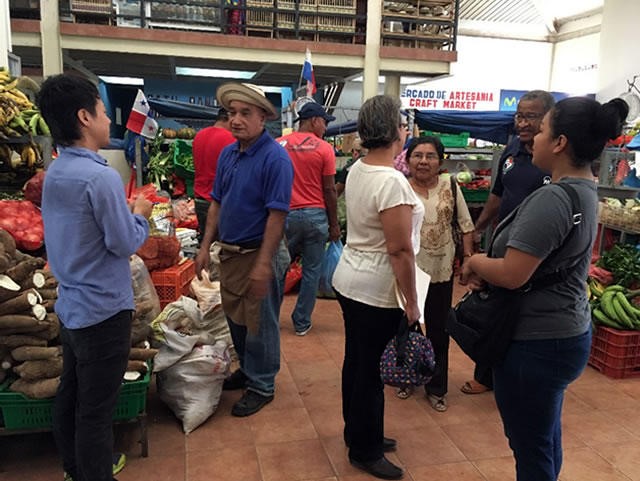
Carrying out the book-reading promotional activity in the village’s central marketplace in Panama.
I wanted to enter an NGO as a recent graduate after University but, I lacked special skills. When I considered where I could gain experience and make the best use of my non-formal educational experiences that I’ve built up to now, the idea for the JOCV came to me. The team was dispatched to Panama where we carried out our main focus for a book-reading promotional activity at the National Library. We found a region where children who have never seen a book live, which is slightly separated from the capital city of Panama. We therefore carried out the implementation of a bookmobile (i.e. an automobile that serves as a traveling library) for them. We continued activities in areas like this and came to realize that we weren’t being attentive enough for these areas’ education. I insisted to a JICA member, in poorly-spoken Spanish, “I want to go to these areas myself!”. One year later, I moved to a capital city of a different region and focused on carrying out activities such as reading aloud to each other and literacy education. Also, there was an area with no library where an indigenous people called Guna (Kuna) lived, so we helped in managing the construction of a library there.
Please tell us the reasons why you joined JVC.
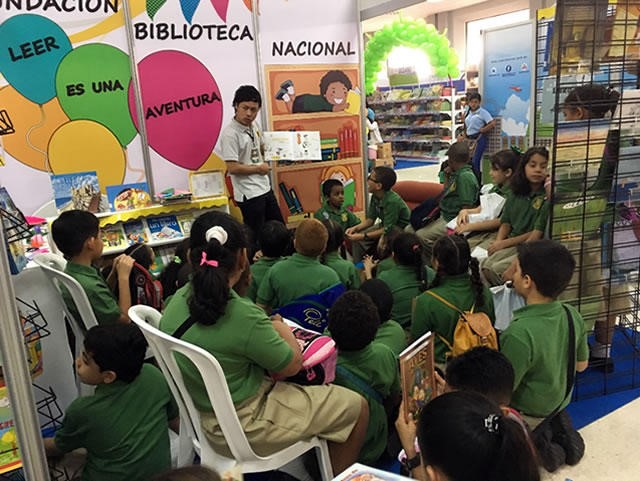
Mr. Yamamoto conducting an out loud reading activity.
Truthfully, after I came back from Panama, I worked at a Philippine NGO for half a year by making use of a system from JOCV. I carried on with my non-formal education while I was in the Philippines for a while. After my half year activity ended, I thought about what I should do. I thought I wanted to become someone who could connect people working at various places like NGO’s or the Ministry of Foreign Affairs. I came to the conclusion that I wanted to enter a hands-on NGO and thought that in this scene I could pile-up experience for this purpose. From this point on, I was looking at various NGO’s, but while I was researching all of this, I considered the daring NGO, JVC. Originally, I had heard the name, but when I saw JVC’s activities, I could feel how strongly they wanted to settle issues at the root of the problem, how they hoped for world-peace from the bottom of their hearts, and how strong the will they each carried was. There was only one spot open and I submitted my application however, I frankly didn’t think I would pass this first stage. Since I felt that I wanted to chat with the people who worked there, I submitted my application, and somehow, I could advance to the second stage of the interview. I thought to myself, “Yay! I have the chance to chat with them again!”. Until the day of the interview, I thoroughly researched about the people who would interview me. When the day finally arrived, I was met with amazing sincerity as they answered the questions I threw at them. After seeing what they were like, my interest grew in working together with them.
By the way, did you have a preference for the country you worked in?
Even now, I have preference, however the preference is not for the country I work in. I think that anywhere where there are suffering children is good. Since the reality is that the suffering hasn’t changed, certainly the origins of suffering are different for each situation.
Beforehand, you said that you researched a lot about JVC. Has your impression changed before and after entering our office?
My impression changed. At first, I thought there was more of a harsh feeling to the office but in meeting everyone, I feel that there’s a strong mutual respect among the office when working diligently. For example, even though I raised my hand with a question as a new face during a meeting, I was met with very polite answers and firmly listened. Therefore, it will be especially lonely to be residing in a local place from here on out.
What type of work do you think has highest importance before you go?
I wish for nothing but peace. Although the scars left from dispute still remain, I want to return to that time before the damage was done. I want to establish a world where access to things like water and food is common. Especially in relation to the many children who knowing nothing of those times. This has no relation to children or adults but, I think it’s very bothersome living under circumstances that offer no choices. I wish for a world where people can have the ability to choose how to live their own lives and through that, gain meaning from the experiences that amass.
Please teach us your personal motto.
This relates to the subject of our previous talk, but my personal motto is “Now or Never”. It means, if you don’t do it now, then when will you do it. I think it’s fairly rare to be prepared for when you can do something or want to do something. Even though someone can meet many people or go to various places, I really wonder when will this person get a chance like this again? Therefore, I think we should take action without hesitation when we get the chance to do something.
Please leave us with a message for your juniors who have their eyes on international cooperation.
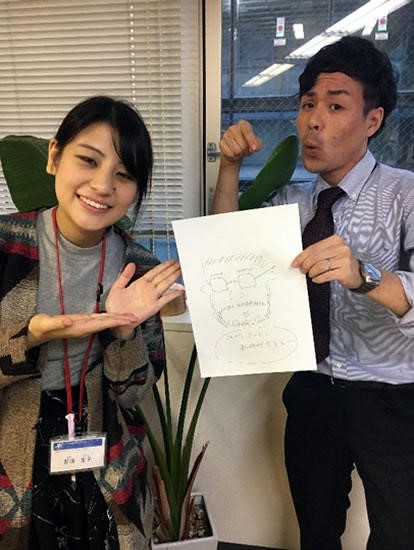
According to him, “the next interview is about a person who makes delicious homemade food! The kind ‘dad’ of JVC. We will talk with that person!” Please look forward to our next interview.
Find what you like and without deceiving yourself, stand tall and face your dreams. When you find what you like, I think it’s important to ask yourself various questions. Asking many questions often leads people to have doubt. However, it’s important to know about yourself, and this includes the negatives and the positives. Therefore, I think it’s okay to have people you dislike and it’s okay to have a quarrel with them as well. However, I don’t want people to create happiness from other’s misfortune. I definitely want to protect that point.
Share This: